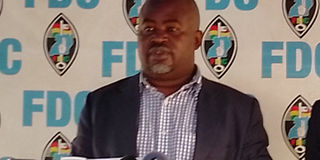Prime
FDC protest govt plan to borrow from local banks

Mr Harold Kaija, the party’s Deputy Secretary Genera. Photo | Courtesy
What you need to know:
Addressing journalists during the weekly press briefing yesterday at party headquarters in Najjanankumbi, Kampala, Ms Margaret Wokuri Madanda, the deputy president for eastern region, said if the government borrows from local banks, the business community may not be in a position to access funds from the same banks
Both the Najjanankumbi and the Katonga Forum for Democratic Change (FDC) factions yesterday condemned the government’s decision to borrow from local commercial banks to fund supplementary budgets that were passed by Parliament last week.
Addressing journalists during the weekly press briefing yesterday at party headquarters in Najjanankumbi, Kampala, Ms Margaret Wokuri Madanda, the deputy president for eastern region, said if the government borrows from local banks, the business community may not be in a position to access funds from the same banks.
“Banks will prefer dealing with the government than the business people. The business community will either fail to find money and run out of business, [and therefore] worsening the unemployment problem in the country,” Ms Madanda said.
At a press conference at their offices on Katonga Road in Kampala, Mr Harold Kaija, the secretary general of the FDC Katonga faction, said borrowing from local banks is likely to affect the economy.
“The money which is going to finance the supplementary budget is not in our Treasury. It is going to be borrowed locally. When it is borrowed locally, it means those are going to be commercial loans whose conditions are that you pay in a shorter period and with high interest rates yet we already have a very bad debt to pay back,” he said.
Last week, Parliament approved three loans amounting to more than Shs5.2 trillion, including Shs3.5 trillion from local commercial banks to fund the supplementary budget, Shs1.227 trillion from World Bank for smart agriculture and Shs554.689 billion from China to finance the e-government infrastructure project phase.
Mr Kaija said accountability of the money must be availed to ensure that it is spent on the intended purposes.
However, Ms Madanda wondered if the government had exhausted all the sources of borrowing to the point that it is going to local banks to compete with the local businesses.
She questioned the government’s planning system that always leaves room for supplementary budgets instead of planning for such activities in the main budget.
“The government knew [it was] going to host the Non-Aligned movement (NAM), G77 and the population census, why wasn’t this money put in the main budget? Why does this money come through a supplementary budget?” Ms Madanda wondered.
This is one of the issues that the two factions have agreed on following their fallout early this year over accountability and governance issues in the party.
Mr Kaija also condemned what he described as state capture of the Judiciary.
He revealed that the Katonga faction had commenced grassroots elections on December 9 to create structures at village and parish levels.
“We want to be felt in every corner of the country. We don’t have the manpower to do the job at once, we are doing it in a piecemeal. We have sent most of our leaders upcountry, including the electoral commission team, to ensure that the exercise goes on smoothly,” he said.
“We urge our leaders to engage in the process. Those who have not received election materials should contact the coordinators to ensure that these elections are carried out. The national elections will be conducted early next year,” he added.
In response, Ms Madanda said the Najjanankumbi team is concerned about the ongoing elections, saying the National Council meeting will on Friday determine their fate.
She noted that if any of their party members participate in the elections in question, they would face the disciplinary committee or courts of law.




